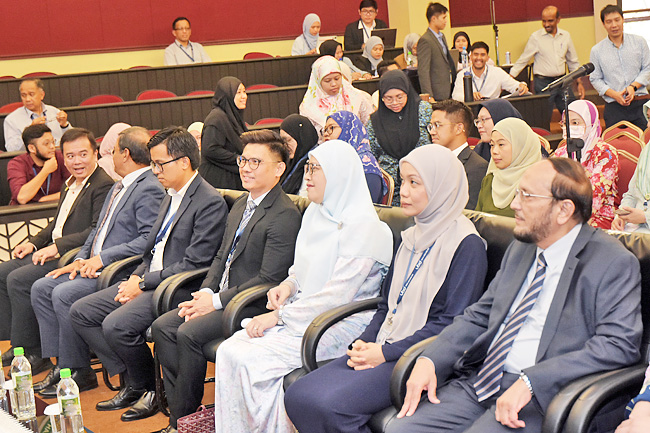In 2022, 496 cyberattacks were reported to Brunei Computer Emergency Response Team (BruCERT), where 33 per cent were related to social media, 20 per cent involved scams and the remainder comprised cases of malware, hacking and cyberbullying.
Permanent Secretary (Economy, Trade and Industry) at the Ministry of Finance and Economy Dr Hajah May Fa’ezah binti Haji Ahmad Ariffin said this in her keynote address at the 2nd Brunei Economic Forum 2023 on ‘Socio-Economic Planning for Brunei: Challenges and Opportunities’ at Universiti Brunei Darussalam (UBD) yesterday.
She also said, “While such dangers are alarming, it should not deter us from fully embracing and riding the Industrial Revolution 4.0 (IR4.0) wave. After all, digitalisation and technological innovation have massive potential in allowing us to leapfrog traditional growth models.”
She added, “Everyone needs to be heedful that with great ease comes great risks. This poses questions on how best we can leverage on digitalisation and advanced technologies to enhance value and boost innovations, while at the same time protect itself and society from the rapidly evolving risks and challenges that it will pose.
“We need not do this alone. Beyond the border and within the region, ASEAN has just launched the negotiation of the Digital Economy Framework Agreement (DEFA), which is set to be completed by 2025.”
“An outcome specified in the Bandar Seri Begawan Roadmap of ASEAN Digital Transformation Agenda, DEFA is a comprehensive agreement on digitalisation which covers digital infrastructure and its interoperability, cybersecurity, digital talents and digital ID among others.
It is expected to boost ASEAN economy to USD2 trillion by 2030. So, this is an opportunity for us to grow more and smarter,” she added.


Speaking of recovery from the pandemic, she said, “It would be amiss of me not to address digitalisation and the benefits and opportunities that we can derive from it. During the COVID-19 pandemic, digitalisation allowed us to continue with our daily lives and ensure minimal disruption to our economic activities. This in turn led to the acceleration of digitalisation efforts and uptake across the government, businesses and citizens. The BruHealth app, for instance, has now evolved into a more comprehensive healthcare platform.
“Beyond government services, businesses have also embraced digitalisation as evidenced by the growth and evolvement of platforms like GoMamam, HeyDomo and DART.
“Fully aware of the growth potentials that IR4.0 offers, the government has also continued to usher SMEs to move beyond simply being a tech-consumer to becoming a tech-disruptor – encouraging them to leverage on advanced technologies in order to enhance their value-add and innovate. Such efforts include the establishment of the Brunei Innovation Lab, a local ecosystem facilitator to encourage technopreneurs development through a network comprising of developers, start-ups, enterprises, academia and government institutions.”
The last day of the 4th International Conference on Business, Economics and Finance also included a panel discussion on ‘Shaping Brunei’s Socio-Economic Future’. Panellists included Ghanim International Corporation Chief Executive Officer Dr Nur Rahman, Acting Head of Manpower Planning and Employment Council Secretariat at the Prime Minister’s Office Noraini binti Haji Mohamad Jamudin and Brunei Darussalam Central Bank Assistant Executive Director, Head of FinTech Haji Mohd Khairul Zaki bin Haji Mohidin who shared their views and opinions of Brunei’s socio-economic outlook.
This was followed by a question-and-answer session moderated by Pengiran Dr Hajah Norulazidah binti Pengiran Haji Omar Ali and UBD School of Business and Economics’ lecturer Dr Siti Fatimahwati binti Pehin Dato Haji Musa.
There were also parallel sessions with 28 papers covering themes of organisational performance and dynamics in HEIs, economic policy and development, halal industry and entrepreneurship, innovation and performance, environment, social, and governance, digital transformation, organisational excellence and sustainability, and monetary and financial system.
The conference concluded with an award presentation ceremony for best papers in business, economics, accounting and finance, and entrepreneurship categories. The winners were Nabilah Jeffery for ‘Exploring Unchartered Horizons: Unveiling New Challenges of Fashion Upcycling Enterprises and its Solution Across UK, US and Southeast Asia (Entrepreneurship)’; Mohammad Hadi Hazwan bin Dato Paduka Haji Haini for ‘Is gender an impediment to innovation? Evidence from Malaysian SMEs’; and Muhammad Abdus Salam for his presentation on ‘Factors Affecting Mobile Payment Acceptance In Generation Z: An Analysis of the Unified Theory of Acceptance and Use of Technology (UTAUT) Approach’. – James Kon


